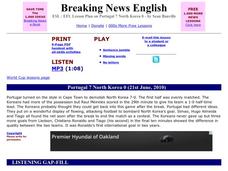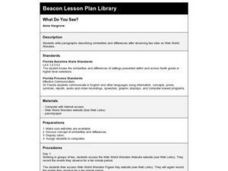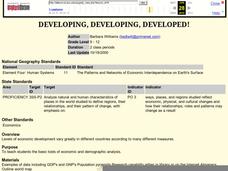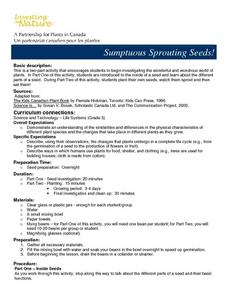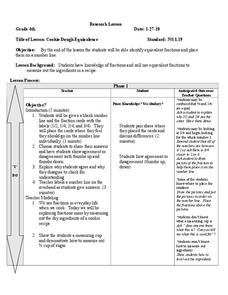Curated OER
Wonderful World of Dinosaurs
Second graders obtain information about the characteristics of diet, locomotion, behavior, habitat, and anatomy of five dinosaurs by observing the Wonderful World of Dinosaurs HyperStudio presentation. They complete a student worksheet.
Curated OER
Water Works Wonders
Learners examine where water is found in the world, how we use it, and the various forms it takes. They observe the refraction of light through a prism, record the day and night sky over a week's time, and create a topographic model of...
Curated OER
Wonders of the World
Third graders examine two-dimensional objects and create a 3-D image of the object. They make models of the Taj Mahal and buildings in Delhi.
Curated OER
Natural Wonders
In this natural wonders instructional activity, student unscramble words, using lyrics to a song titled "Natural Wonders." An answer key is included on page 3. No song link is given.
Curated OER
Breaking News English World Cup: Germany 0 Serbia 1
In this English worksheet, students read an article about Serbia v. Germany in the World Cup and then respond to 1 essay, 10 fill in the blank, 12 short answer, 20 matching, and 10 spelling questions...
Curated OER
Breaking News English: World Cup: Portugal 7 North Korea 0
In this English learning exercise, students read an article about Portugal v. North Korea in the World Cup and then respond to 1 essay, 10 fill in the blank, 12 short answer, 20 matching, and...
Curated OER
What Do You See? (Web World Wonders)
Fourth graders write paragraphs describing similarities and differences after observing two sites on Web World Wonders. They read their paragraphs to the class for critique.
John Wiley & Sons
Build a Pyramid
Learners discover fascinating facts about the Great Pyramid of ancient Egypt and construct a scale model of the pyramid with this fun activity worksheet.
Curated OER
From Sheep to Rug
Ever wonder where wool comes from? How it is used to make a woven rug? Introduce the Native American craft of rug making to your preschool or kindergarten class with a discussion. Learners examine and discuss images of a Native American...
University of California
Principles vs. Practices
Have you ever wondered what your own World Order would look like? Scholars use primary and secondary documents as well as video clips to investigate and analyze the Cold War. Using the sources, the principles and practices of nations...
American Museum of Natural History
Global Grocery
A walk through the grocery store is like a walk around the world. An interactive activity shows popular grocery items and where the ingredients originate. Perfect as a remote learning resource, the lesson connects groceries to the...
Curated OER
Why do wars occur?
Understanding the causes of war is one way (possibly) to prevent it. World War II is used as a case study to facilitate an understanding of reasons why wars start. Topics covered included Totalitarianism, scarcity of resources, need for...
Curated OER
Han Emperors in China
History can be so dramatic! Expose your class to the rise and fall of the Han Dynasty in China. The 400 year span of this Dynasty is covered in an easy to follow format, great for promoting food. Note test taking skills. Students will...
Curated OER
Developing, Developing, Developed!
Students differentiate among and explain various levels of economic development around the world. They see that levels of economic development vary greatly in different countries according to many different measures.
University of North Carolina
Religious Studies
What is the difference between religion and religious studies? Readers find out after reading an online handout. It outlines common assignments in religious studies classes, such as critically evaluating religious texts and writing...
Curated OER
Sumptuous Sprouting Seeds!
Third graders investigate the wonderful and wondrous world of plants. They examine the inside of a seed, explore the different parts of a seed, plant their own seeds, watch them sprout and then eat them! They describe, using their...
Curated OER
Small Wonders
Young scholars investigate some of the 'mysteries' of the animal, marine and insect worlds, and create student books explaining their findings to younger students.
Curated OER
Seven Wonders of the World: The Hanging Gardens of Babylon
Students discover the Hanging Gardens through archaeology. For this Near Eastern history lesson, students read the book, Ancient Iraq:Archaeology Unlocks the Secrets of Iraq's Past, by Beth Gruber, then create their own hanging garden.
Curated OER
"It's the Most Wonderful Time of the Year,"— Or Is It?
Tips for helping students who experienced poverty or family strife over the holidays.
Curated OER
The World of Myth and Legend
After studying various myths, quiz your learners! British epics such as Beowulf are included, as well as Greek myths such as Icarus and Achilles. Fifteen multiple-choice and fill-in-the-blank questions challenge your class.
Curated OER
Cookie Dough Equivalence
Who doesn't love cookies? In this lesson, learners follow a recipe to make cookies, practicing their ability to compare fractions as they go. This is a wonderful way to motivate your class to practice this important skill.
Curated OER
Wetlands Are Wonderful
Students study the characteristics of wetlands. They are introduced to terms and different examples of wetlands. The hands-on activity reinforces the different parts of the wetlands, and provides a working model of a wetland.
Saddleback College
The Wonder of Words
If your language arts students think etymology isn't relevant to their everyday lives, show them a presentation that will prove them wrong! The slideshow provides explanation about various words, roots, and suffixes that have adapted in...
Achieve
Ground Beef
Ever wonder how a butcher creates the different types of ground beef? Young mathematicians explore the methods butchers use to create their desired ground beef quality. Given a combination of two types of meat with varying...
Other popular searches
- Seven Wonders of the World
- 7 Wonders of the World
- Natural Wonders of the World
- 7 Wonders of the Ancient World
- Ancient Wonders of the World
- World Wonders
- Web World Wonders
- Modern World Wonders
- The 7 Wonders of the World
- Natural Wonders of World
- 7 World Wonders







